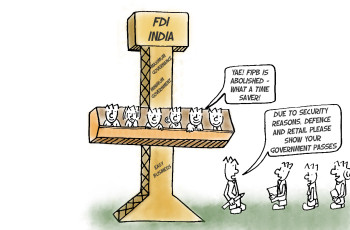Wine & Art… Alternative Investments?!
World over, investments are usually made in shares, stocks, bonds, fixed deposits and or real estate. This is particularly true with reference to the Indian investment scenario. While there are stringent regulations for investments in mutual funds and collective investment schemes, there was hardly any regulation to address and protect interests of venture capitalists and private equity investors especially in public institutions, real estate and related activities.
Did you know?
The first private Venture Capital Fund (VC Fund) was sponsored by Credit Capital Finance Corporation (CFC) and promoted by Bank of India, Asian Development Bank, and the Commonwealth Development Corporation.
Objective
With a view to regulate, protect interests and provide incentives to venture capital funds and private equity funds to enable them invest freely in start-ups in India, SEBI introduced the Securities and Exchange Board of India (Alternative Investment Funds) Regulations, 2012 which came into force on 21st May, 2012.
Alternative Investment Fund(s)
An alternative investment fund (AIF):
- Is any privately pooled investment fund (obtained either from Indians or foreigners)
- It is in the form of a company, trust, body corporate or LLP
- Is not governed by jurisdiction of any regulatory agency in India, SEBI or otherwise.


From the above, it is obvious that alternative investments are those that are not traditional asset classes. It includes mainstream assets such as real estate or commodities or even luxury goods such as art or wine. In the Indian context also there was an art fund house that was traded in between 2000-2006. However, it has been observed that in India alternative investment funds have been mainly concentrating in the venture capital, private equity and hedge funds space.
However, it is important to de-jargon the above terms:
Venture Capital Fund
Investment funds that manage money of investors seeking to invest in start-ups & SME’s.
Private Equity Fund
A collective investment scheme used for making investments in various equity securities. Some debt securities also.
Hedge Fund
An offshore investment fund, typically formed as a private limited partnership, that engages in speculation using credit or borrowed capital.
The SEBI (Alternative Investment Funds) Regulations in a nut shell:
- The Alternative Investment Fund may raise funds from any investor whether Indian, foreign or non-resident Indians by way of issue of units;
- It is aimed at high net worth individuals. The minimum investment into such a funds is One Crore rupees.
- Overall corpus of such fund should be a minimum of Rs. 20 Crores.
- The maximum number of investors should be 1,000.
- The fund manager or promoter should have contributed to the capital, at least 2.5% or Rs.5 crore, whichever is lesser.

Conclusion
The year 2015 witnessed a record VC investment and angel fund investment. With an intention to bring in more foreign funds in to India, the Union budget for financial year 2016, highlighted that foreign investments will be allowed in alternative investment funds (AIFs). This is a big boost to the nascent AIF industry in India. This is expected to increase inflow of foreign funds into India. The SEBI has created and given structure to this emerging investment space. The SEBI had constituted a standing committee ‘Alternative Investment Policy Advisory Committee’ (AIPAC) under chairmanship of Shri. N. R. Narayana Murthy in March 2015. The AIPAC had submitted its second report to SEBI in December 2016 with various recommendations to ensure continuous monitoring and effective provisions of laws which facilitate foreign inflow into India.
Sources:
- investopedia.com/terms/v/vcfund.asp
- https://en.wikipedia.org/wiki/Private_equity_fund
- Report submitted by Alternative Investment Policy Advisory Committee (AIPAC)









 He holds a Bachelor’s and Master’s Degree in Corporate Secretaryship and a Degree in Law. He is a Fellow member of the Institute of Company Secretaries of India and an Associate Member of the Corporate Governance Institute, UK and Ireland. He has also completed a program from ISB on ‘Value Creation through Mergers and Acquisitions.
He holds a Bachelor’s and Master’s Degree in Corporate Secretaryship and a Degree in Law. He is a Fellow member of the Institute of Company Secretaries of India and an Associate Member of the Corporate Governance Institute, UK and Ireland. He has also completed a program from ISB on ‘Value Creation through Mergers and Acquisitions. Mr P Muthusamy is an Indian Revenue Service (IRS) officer with an outstanding career of 30+ years of experience and expertise in all niche areas of Indirect Taxes covering a wide spectrum including GST, Customs, GATT Valuation, Central Excise and Foreign Trade.
Mr P Muthusamy is an Indian Revenue Service (IRS) officer with an outstanding career of 30+ years of experience and expertise in all niche areas of Indirect Taxes covering a wide spectrum including GST, Customs, GATT Valuation, Central Excise and Foreign Trade. During his judicial role, he heard and decided a large number of cases, including some of the most sensitive, complicated, and high-stake matters on insolvency and bankruptcy, including many cases on resolution plans, shareholder disputes and Schemes of Amalgamation, De-mergers, restructuring etc.,
During his judicial role, he heard and decided a large number of cases, including some of the most sensitive, complicated, and high-stake matters on insolvency and bankruptcy, including many cases on resolution plans, shareholder disputes and Schemes of Amalgamation, De-mergers, restructuring etc., A K Mylsamy is the Founder, Managing Partner and the anchor of the firm. He holds a Degree in law and a Degree in Literature. He is enrolled with the Bar Council of Tamil Nadu.
A K Mylsamy is the Founder, Managing Partner and the anchor of the firm. He holds a Degree in law and a Degree in Literature. He is enrolled with the Bar Council of Tamil Nadu. Mr. K Rajendran is a former Indian Revenue Service (IRS) officer with a distinguished service of 35 years in the Indirect Taxation Department with rich experience and expertise in the fields of Customs, Central Excise, Service Tax and GST. He possesses Master’s Degree in English literature. Prior to joining the Department, he served for the All India Radio, Coimbatore for a period of about 4 years.
Mr. K Rajendran is a former Indian Revenue Service (IRS) officer with a distinguished service of 35 years in the Indirect Taxation Department with rich experience and expertise in the fields of Customs, Central Excise, Service Tax and GST. He possesses Master’s Degree in English literature. Prior to joining the Department, he served for the All India Radio, Coimbatore for a period of about 4 years. An MBA from the Indian Institute of Management, Calcutta, and an M.Sc. in Tourism Management from the Scottish Hotel School, UK, Ashok Anantram was one fo the earliest IIM graduates to enter the Indian hospitality industry. He joined India Tourism Development Corporation (ITDC) in 1970 and after a brief stint proceeded to the UK on a scholarship. On his return to India, he joined ITC Hotels Limited in 1975. Over the 30 years in this Organisation, he held senior leadership positions in Sales & Marketing and was its Vice President – Sales & Marketing. He was closely involved in decision making at the corporate level and saw the chain grow from a single hotel in 1975 to a very large multi-brand professional hospitality group.
An MBA from the Indian Institute of Management, Calcutta, and an M.Sc. in Tourism Management from the Scottish Hotel School, UK, Ashok Anantram was one fo the earliest IIM graduates to enter the Indian hospitality industry. He joined India Tourism Development Corporation (ITDC) in 1970 and after a brief stint proceeded to the UK on a scholarship. On his return to India, he joined ITC Hotels Limited in 1975. Over the 30 years in this Organisation, he held senior leadership positions in Sales & Marketing and was its Vice President – Sales & Marketing. He was closely involved in decision making at the corporate level and saw the chain grow from a single hotel in 1975 to a very large multi-brand professional hospitality group. Mani holds a Bachelor Degree in Science and P.G. Diploma in Journalism and Public Relations. He has a rich and varied experience of over 4 decades in Banking, Finance, Hospitality and freelance Journalism. He began his career with Andhra Bank and had the benefit of several training programs in Banking.
Mani holds a Bachelor Degree in Science and P.G. Diploma in Journalism and Public Relations. He has a rich and varied experience of over 4 decades in Banking, Finance, Hospitality and freelance Journalism. He began his career with Andhra Bank and had the benefit of several training programs in Banking. Mr. Kailash Chandra Kala joined the Department of Revenue, Ministry of Finance as ‘Customs Appraiser’ at Mumbai in the year 1993.
Mr. Kailash Chandra Kala joined the Department of Revenue, Ministry of Finance as ‘Customs Appraiser’ at Mumbai in the year 1993.
 S Ramanujam, is a Chartered Accountant with over 40 years of experience and specialization in areas of Corporate Tax, Mergers or Demergers, Restructuring and Acquisitions. He worked as the Executive Vice-President, Group Taxation of the UB Group, Bangalore.
S Ramanujam, is a Chartered Accountant with over 40 years of experience and specialization in areas of Corporate Tax, Mergers or Demergers, Restructuring and Acquisitions. He worked as the Executive Vice-President, Group Taxation of the UB Group, Bangalore. K K Balu holds a degree in B.A and B.L and is a Corporate Lawyer having over 50 years of Legal, Teaching and Judicial experience.
K K Balu holds a degree in B.A and B.L and is a Corporate Lawyer having over 50 years of Legal, Teaching and Judicial experience. Justice M. Jaichandren hails from an illustrious family of lawyers, academics and politicians. Justice Jaichandren majored in criminology and then qualified as a lawyer by securing a gold medal. He successfully practiced in the Madras High Court and appeared in several civil, criminal, consumer, labour, administrative and debt recovery tribunals. He held office as an Advocate for the Government (Writs Side) in Chennai and was on the panel of several government organizations as senior counsel. His true passion lay in practicing Constitutional laws with focus on writs in the Madras High Court. He was appointed Judge, High Court of Madras in December 2005 and retired in February 2017.
Justice M. Jaichandren hails from an illustrious family of lawyers, academics and politicians. Justice Jaichandren majored in criminology and then qualified as a lawyer by securing a gold medal. He successfully practiced in the Madras High Court and appeared in several civil, criminal, consumer, labour, administrative and debt recovery tribunals. He held office as an Advocate for the Government (Writs Side) in Chennai and was on the panel of several government organizations as senior counsel. His true passion lay in practicing Constitutional laws with focus on writs in the Madras High Court. He was appointed Judge, High Court of Madras in December 2005 and retired in February 2017. S Balasubramanian is a Commerce and Law Graduate. He is a member of the Delhi Bar Council, an associate Member of the Institute of Chartered Accountants of India, the Institute of Company Secretaries of India and Management Accountants of India.
S Balasubramanian is a Commerce and Law Graduate. He is a member of the Delhi Bar Council, an associate Member of the Institute of Chartered Accountants of India, the Institute of Company Secretaries of India and Management Accountants of India.